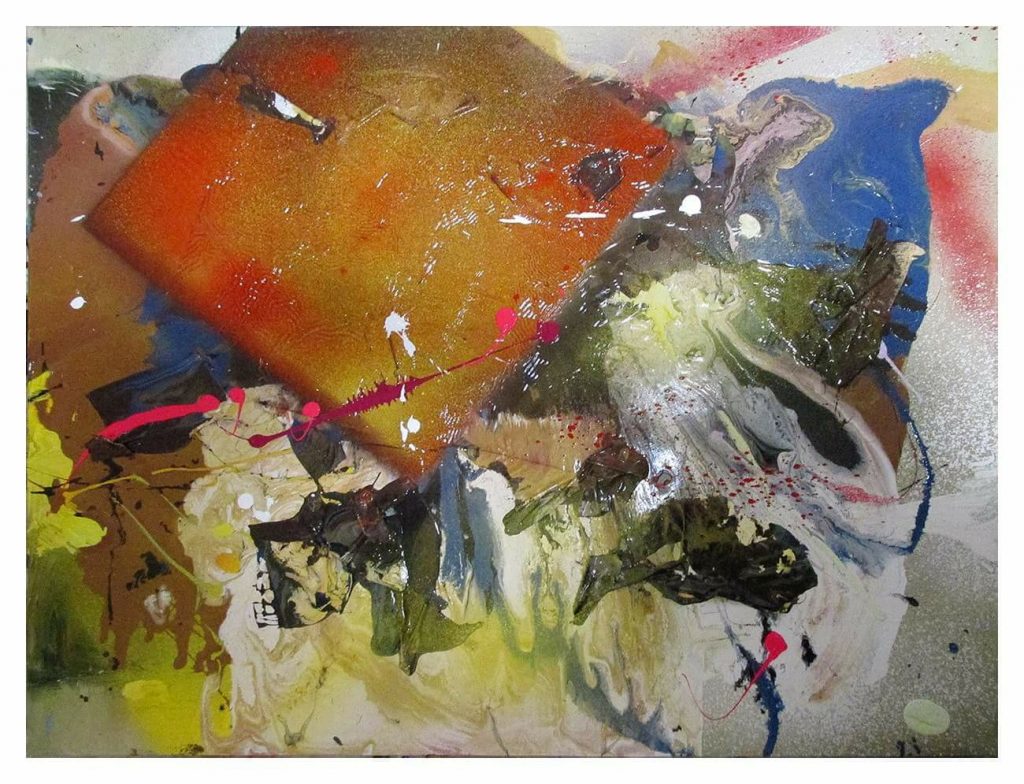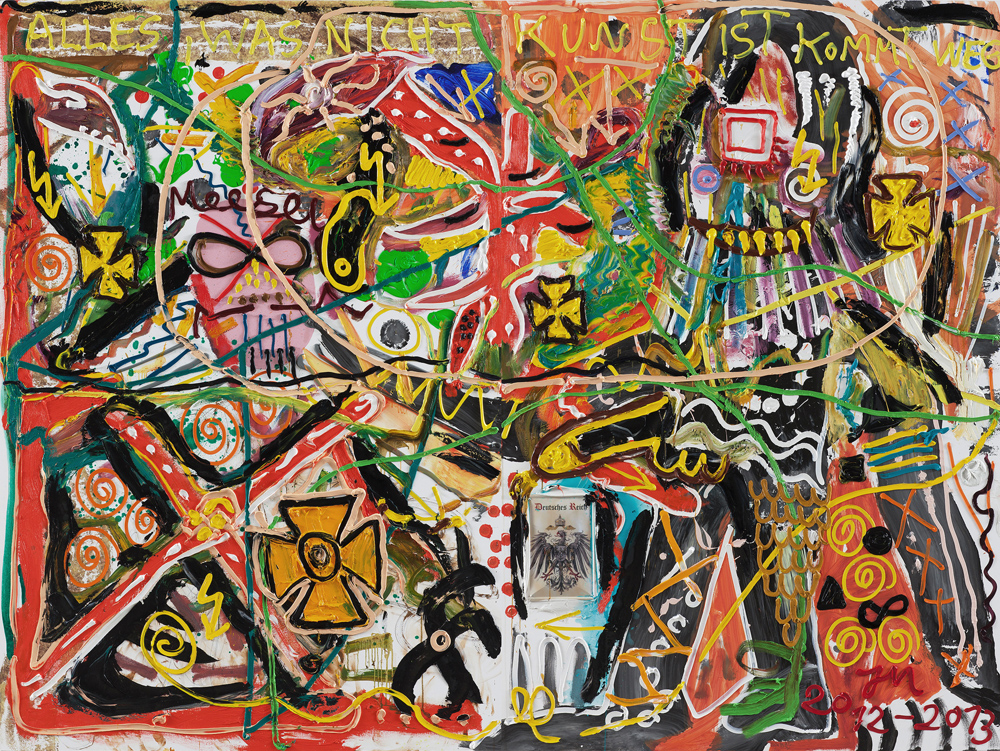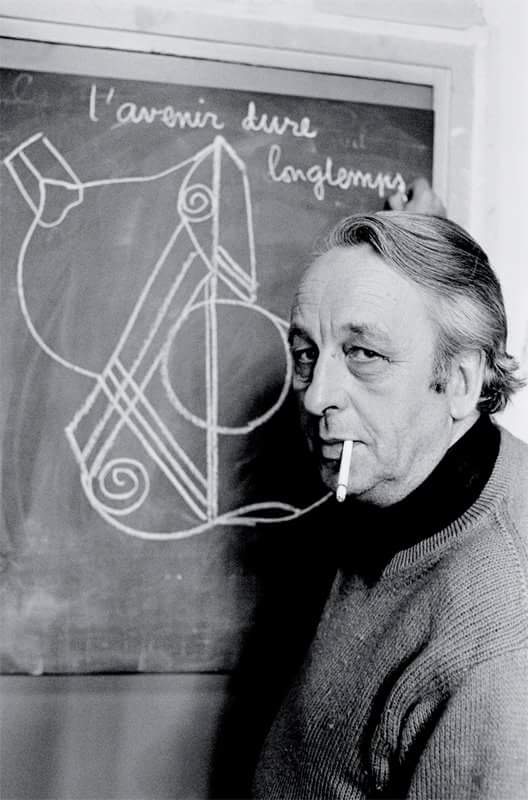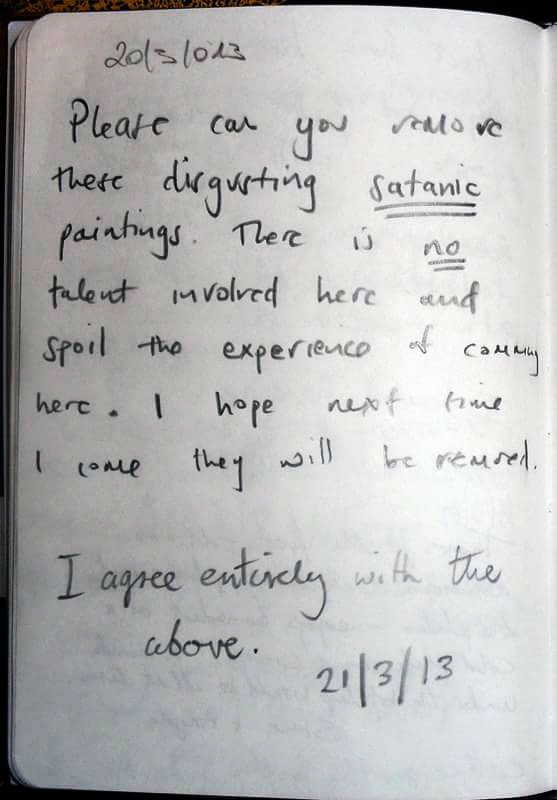EC: Ideologies: Divisions, Schisms, Isms and Unbreachable Gulfs
“…Ideology has very little to do with ‘consciousness’ – it is profoundly unconscious.” – Louis Althusser1 cited in Hebdige, D. (1979), ‘Subculture: The Meaning of Style’, London, Routledge, p.12

EC, ‘Sudden Shifts in Behavior, Small Changes in Circumstance’ (2017) acrylic, oil-based household paint & spray paint on canvas, 103 x 77 cm
It seems to be that we in the art world often very skillfully stifle our capacity to enter into one another’s experience through our ideologies. If we think of ideology as a force, we can see that there is inherent within it the idea of control of opinion, and once we exert that control we are prevented from entering into the ‘other’s’ experience. However, ideology is not simply imposed on us, it is also an inner impulse in response to our world; therefore it is unconscious and subjective. We have to invest in a (subjective) opinion, and if we are so invested we might well fear loss and become highly defensive, like a bunch of nutty lawyers not interested in the richer story. If ideology is something we construct, and not a universal truth, then an ideology is open to debate and criticism. Yet many times it feels like this debate or criticism is a pseudo one, a flashy showing off of intellectual prowess by pundits determined to learn nothing from one another and to stick their fingers in their ears singing “la, la, la”. This approach fundamentally lacks generosity. It seems to me to be crucial, this idea of a lack of generosity – to have the capacity to allow for things to fall apart at the seams and to find out how to handle that. Isn’t art that is generous something that might stir up, encourage, increase and even arrange entering the experience of another rather than stifling that possibility? What are we doing to each other and why?
“The power of the culture industry’s ideology is such that conformity has replaced consciousness” – Theodor Adorno2 Adorno, T. (1991), in Bernstein, J.M. (ed) ‘The Culture Industry: Selected Essays on Mass Culture’, London, Routledge, p.104
We are surrounded by sophisticated constructs, and these edifices are meant to not fall apart when under question. Is there, in that case, an assumption that stability is good? Perhaps, instead, one could take a position that might not be about a kind of ossified stability. What if someone’s position allows for (and actively encourages) movement, change, chaos, gaps, leaps, contradiction and complexity? What if we can have the generosity of interest to find value in something opposing or complicating a position we believe in? What if we dare to allow ourselves to feel uncomfortable and look through another lens? Is it too much like a violence to that which we might be (narcissistically) attached? (I probably should bring in Freud’s theory “der Narzissmus der kleinen Differenzen” – The Narcissism of Small Differences. If we are narcissistically attached to our ideologies then perhaps we are creating a superficial sense of our position’s own uniqueness, whereas in fact there might be a lot of ‘sameness’ shared with others. To put it another way, there might be ground that is connected that has been oversimplified in order to keep things apart). If there is a narcissistic attachment to an ideology then the significance of the generosity that (to my mind) abstraction embodies, for example, will be lacking. Jonathan Meese ranting about “these people” who are so attached to ideologies are “so silly they have to go to therapy” might be a good bit of advice, but you’ve got to want to change to seek help. The resistance is too high.

Jonathan Meese, ‘Ich Scheiss’ Aufm Mars II’ (2013) oil, acrylic, acrylic modelling paste and mixed media on two canvases, 210 x 280 x 3.3cm
“…Because it is a good feeling to do it in art…totally, no problem, because I do it without ideology. People say, “Hey! You use these symbols, also, Hakenkreuz or Eisernes Kreuz. These are ideological symbols!” Are these people crazy? In a cup there is no ideology. They are brainwashed these people. They are so silly they have to go to therapy. Ja. In a symbol, in an object there is no ideology. It’s your projection, it’s in your brain. In a Eisernes Kreuz or Hakenkreuz there is nothing bad and if somebody thinks that there is something bad in this, go into the past. Don’t bother me and the future with your existence!….Because in symbols, in objects, in animals there is no ideology. You put it into it…the adult brain, no, only the adult brain. No child is, has a fear of a Hakenkreuz, never! No animal is afraid of a symbol, never! An animal is afraid of a bigger animal that eats him up! But symbols they are free of ideology…And please don’t project..And if you project then you are the evil, you are the projector. You should never project! And never let yourself represented by ideology. Never let ideological represent you, never! Never vote for ideology, never!” – Excerpt from Jonathan Meese Interview: A Soldier Saluting Art3You can watch the whole video here: https://youtu.be/lkNOfvUJdfI
Battles take place between various fields of activity and a mechanistic view is taken up, whereupon integral experience is split up, often into these hierarchical positions. For example, the idea that language is superior to visual thinking; or that there is no such thing as visual thinking at all! I think those kind of assertions do a disservice to both, and to cognition itself. Surely our minds and ideas are more elastic – we’re constantly having to separate and unite things, absorb the new and adapt. Life itself is like that, and involves some improvisation, some uncertainty; and there is always the potential for the risk of loss of a cherished stance. That can hurt, and everyone raises their voices with tears in their eyes and lumps in their throats, supposedly having a rational discussion (where of course subjectivity is not involved because clearly we are all so cool, composed and objective). So you end up with a really objective (not), rational punch up! My way or the highway! A big no entry sign. The ideology we might think we freely choose to occupy might in fact occupy us in such a way that we hand over our elasticity of thought, remaining convinced that we are free to believe in what we believe in. It might well be that there are huge contradictions, overlaps, gaps, dissonance, discord and ideas that cannot meet, but there might, in fact, be no need to split these things apart from a complex whole. This ‘whole’ might be very chaotic and it might be that we need to remove our habitual lenses, abandon our resistance and allow something that is intellectually and/or emotionally precious to us to be broken. Opposition, it might be said, is the prerequisite to union. Things are cooking.

Isms, A Dictionary (1968) Compiled by Mary Walton, B.A., F.L.A and her staff at the General Reference Library. Second edition revised by Phyllis E. Charlesworth B.A., F.L.A, Sheffield, EP Publishing Ltd
“States of conviction conceal the sense in which we are continually making our mind up.” – Adam Phillips4Phillips, A. (1994) ‘On Flirtation’, London, Faber & Faber, Preface pp1-2
Apparently, a formed construct, all neatly tied up and left to stand alone with no interpenetration is a sign of strength, but it is invariably occupying a defensive position with no permeability (and something tells us that to be permeable is a sign of weakness). However, the ability to contradict ourselves, I think, is a good thing, and a too-heavy editing of our thoughts cuts off the oxygen to this mobility of mind. There can then be no room for chaos, for fertilization, for the seed of the old to decay and for the new to be born of it, no room for stretching beyond that construct, for bifurcations and surprising finds. That might involve too much shock. There’s too much to mourn if our ideologies allow for the flexibility life and art need in order to be alive and integral. Instead we’ve got a lot of defensive people not in the least bit interested in looking outside of their intellectual fortress, terrified of change and of their world falling apart, sparring with one another ad infinitum. Must we defend our positions with turgid wit and dry defensiveness until it all congeals and then crumbles to lifeless dust? (Adorno was spot on about the new becoming the next boss and in turn becoming just like the old boss. Quick, find a new ideology to sell what we are doing next! – Is art ‘an object of utility’? The Marxist idea, that there is a Capitalist truth to ideology that is all lies, rears its head in an art world where art is now part of the entertainment industry). The teams of lawyers do not get at ‘the bigger picture’ with all its layers but just set up their own version of events and stand by it to the very bitter dead-end. And it is bitter; and also quite mean, and not lively at all. Let’s build things that can fall apart!
Wait, I am being ideological.
Wasn’t Meese too?
“What seems to take place outside ideology (to be precise, in the street), in reality takes place in ideology. What really takes place in ideology seems therefore to take place outside it. That is why those who are in ideology believe themselves by definition outside ideology: one of the effects of ideology is the practical de-negation of the ideological character of ideology by ideology: ideology never says, ‘I am ideological.’” – Louis Althusser5 Althusser, L. (2014) ‘On the Reproduction of Capitalism: Ideology and Ideological State Apparatuses’ London & New York, Verso, page citation pending
Returning to Meese for a moment leads me to recall an experience I had where ideology and projection reared their heads: I once put on a solo show of my abstract paintings in a cottage in the woods. It was not a traditional gallery situation. One of the paintings involved the use of asemic writing and mirror writing (mirror writing being inherently evil of course) and another also contained ‘upside down crucifixes’, according to some people.
Projection is evidently alive and well in North London. I can give them the number of a good therapist too.
Another experience I remember is probably a very common one for artists attending talks and debates about shows. I visited a show that was based around a piece of text: there was an aspect of free association about it, in a linguistic sense, and I had no difficulty in relating to that; I found it interesting and curious as a show. Some of the images were not very ‘visual’ and I felt were to be ‘read’ differently. In other words, I had to enter the other’s experience rather than project my desires and expectations. There were also some great, visually alive and kicking abstract paintings in the show and they excited me, and I found them compelling in a very different way to the rest of the work. I felt that this somewhat contradictory approach was, in a sense, true to the complexity of human experience, and that this show was highlighting that complexity (and perhaps pointed to that gap or mystery that remains once we enter into language and find it full of holes).
“Postmodern knowledge is not simply a tool of the authorities; it refines our sensitivity to differences and reinforces our ability to tolerate the incommensurable. Its principle is not the expert’s homology, but the inventor’s paralogy.” – Jean-Francois Lyotard6 Lyotard, J-F. (1984) ‘The Postmodern Condition: A Report on Knowledge’ (English translation by Geoffrey Bennington and Brian Massumi), Minneapolis, University of Minnesota Press, page citation pending7 Althusser, L. (2014) ‘On the Reproduction of Capitalism: Ideology and Ideological State Apparatuses’ London & New York, Verso, page citation pending
During the talk a painter in the audience became very upset, and one could hear the strain in his voice as he got irate about painting and the need (or his desire) for there to be no words. In their turn, the people giving the talk proceeded to get exasperated by the painter’s insistence on comparing different ways of expressing complex, layered human experience. In truth, he probably wanted a different show, with a different approach, and was comparing experiencing painting to experiencing music where one “needs no text”, as he put it. I think he was missing out, and could have entered into this show in the spirit of its method of enquiry and allowed it to spark up something a bit different, a bit more challenging perhaps. Everyone was upset by the end of the talk because it seemed in some way that one party was trying to rob the other of something they held dear. That need not have been the case: there was, in fact, no robbery, more an addition or enrichment; and there were interesting questions thrown up about cognition, perception, visual thinking, language and the hierarchical positions assigned to them (an ideology in play appeared to place language as a higher function). The ideology of the painter/speaker prevented him from really getting stuck in or engaging with the show. That weird war cuts off all sorts of ideas about complexity and manifold meanings and is therefore a depriving kind of struggle. It is as if ideas in art that open up debate and thoughts about human experience are then clung to as a new ‘truth’, and through this clinging are inevitably shut down again. The irrational and the unmanageable are conveniently swept under the carpet and these expansions of thought, these ‘new’ ideas become rigid in nature and again morph into a coercive ideology, through this splitting off, this containment and defense against any cross pollination or inconvenient untidiness.
One thought on “EC: Ideologies: Divisions, Schisms, Isms and Unbreachable Gulfs”
Comments are closed.



Very much so.